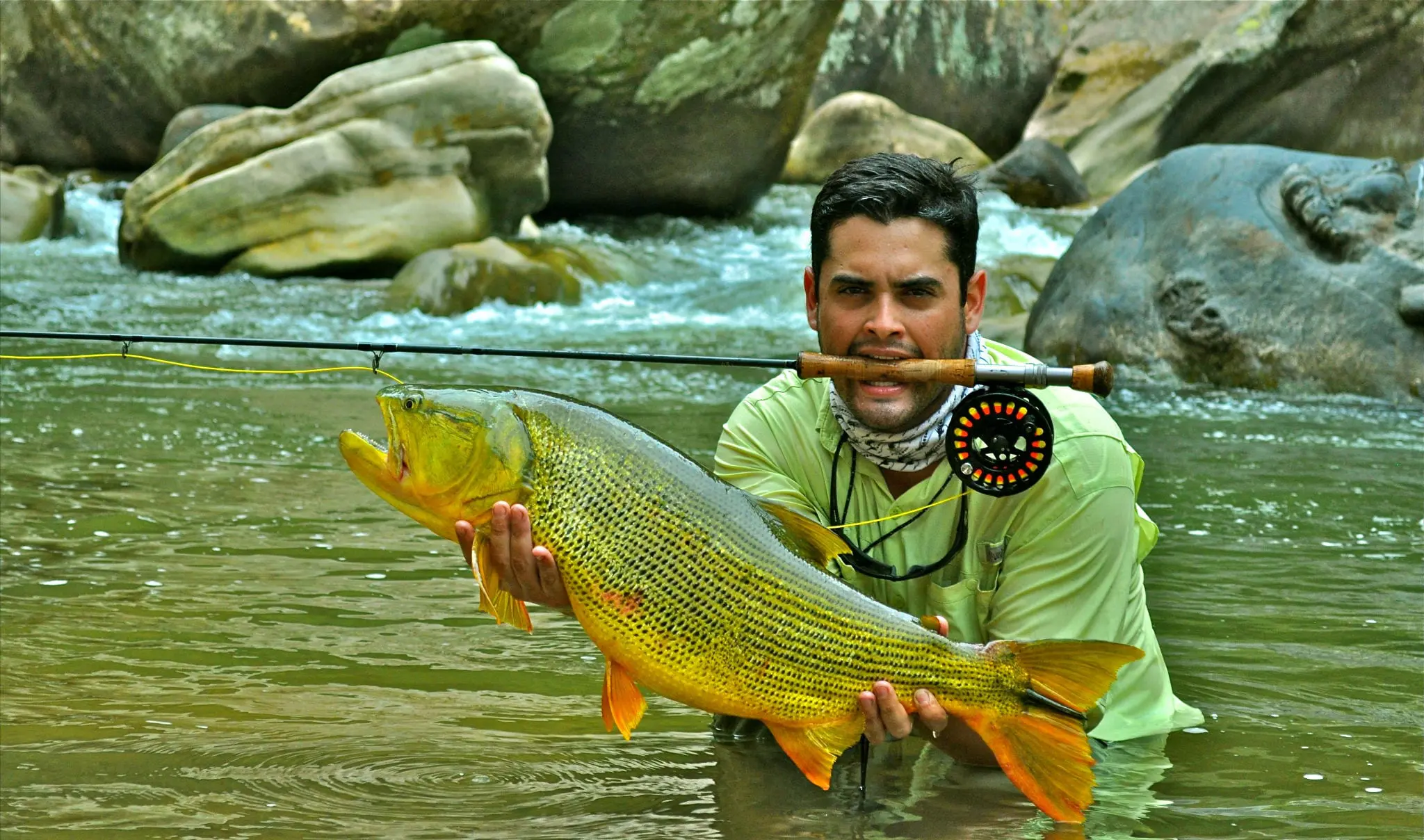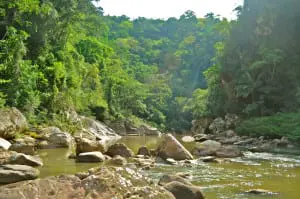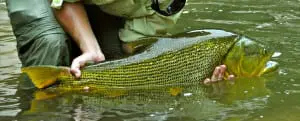Written by Steve Schwartz, Lone Star Outdoor News
Federico Marancenbaum is searching for gold, and he’s finding it in his home country of Bolivia.
He and his business partner, Patrick Taender, are Bolivian natives who have been living in Texas for more than a decade. Now they are working to set up an expedition-style guiding service to find one of the country’s most prized game fish: the golden dorado.
“If you could give us any fish to catch in the entire country, it would be the golden dorado,” Marancenbaum said. “It’s mostly about the places the dorado live in; they need clear, running water and a mountainous region. They are also very aggressive, acrobatic fighters.”
Marancenbaum and Taender’s service is not exactly orthodox. They fly clients in to Santa Cruz, Bolivia, where they then shuttle them to an established basecamp. Their setup is complete with canvas tents, heaters and food service.
“It’s pretty much a glamping kind of deal,” Marancenbaum said. “But once we head out, we are definitely roughing it.”
The groups then head out in dugout canoes carved from the bark of an ochoo tree, up an undisclosed river to fly-fish for the large game fish.
It’s an in-depth process that requires overcoming some logistical difficulties, and it’s an idea that was born in Texas several years ago.
“My family lives in Texas, and I moved here about 14 years ago,” Marancenbaum said. “Education is highly valued here, but in Bolivia it isn’t as highly valued and the schools are not the best.”
Marancenbaum attended the University of Texas at Dallas, and is now teaching a 3rd grade bilingual class for the Garland Independent School District. Taender attended Texas A&M University as a biologist.
“He was basically the one who was a pioneer, and set up many of the camps,” Marancenbaum said of his partner.
They spent time working multiple jobs in order to save enough for their dream of running fly-fishing expeditions to Bolivia. Any time they had off, Marancenbaum said, they spent scouting new locations in Bolivia and searching for the golden dorado — that’s where they came across their current location, and the Tsimani tribe.
“The Tsimani people are one of the few tribes who live fully off of the land,” Marancenbaum said.
He and Taender struck up a deal with the tribe. The Tsimanis receive a portion of the profit from expeditions, and the business — which the two have named Angling Frontiers — will employ some of the tribesmen for work on the expeditions.
As for the region, Marancenbaum simply referred to it as Casare´, which means golden dorado in the Tsimani language. He prefers to keep the exact location under wraps.
“The populations of the fish are very healthy where we are, and the rivers are a piedmont-type area; essentially the headwaters of the Amazon River,” he said. “We take clients for 10-day excursions up the river in our canoes looking for dorado.”
Marancenbaum and Taender, along with the Tsimani porters, guides and boatsmen, travel with the clients, camping in a dense jungle environment. When they do find the fish, it takes ample preparation to take them on the fly. The guides equip the anglers with 40- to 60-pound titanium leaders (to protect against the dorado’s numerous teeth) and generally cast large streamers to fish that can be anywhere from eight to 10 pounds, but sometimes as large as 20 pounds.
In addition to dorado, Marancenbaum said they bring in numerous other species on a fly, including Pacu, Surubi (catfish) and Muturo (giant catfish that can weigh up to 200 pounds).
While the fishing is important, Marancenbaum said the relationship with the Tsimani people has been priceless.
“We’ve taught them that catch and release can be a viable alternative to simply eating the fish,” he said. “We’ve made it economical for them to want to protect this species, since their income can depend on it. Before that, they thought the best place for the dorado was in their stomach.
“This sport-fishing operation is more than just fishing. It not only provides jobs for them, but it creates an incentive for conservation.”
Yet, this lifestyle for Marancenbaum and Taender is only part-time, for now. Marancenbaum is currently working two jobs, but hopes this will be his last year teaching in Garland. He will then spend six to eight months of the year guiding clients in his home country of Bolivia. While he is in Texas, however, he makes the best out of it.
“I’ll try and catch anything and everything when I get the chance,” he said. “I like to go fly-fishing for bass, panfish, anything. I go fish up to Broken Bow (Oklahoma) a lot.”
But free time is tough to come by.
“It definitely is a sacrifice, you have no idea,” Marancenbaum said of he and Taender’s efforts. “I get to see my wife every couple of days, just from working so much of the time.”
If anything, his time in Texas has given him the chance to chase his dream, ironically in a completely different country.
Photos by Federico Marancenbaum.




